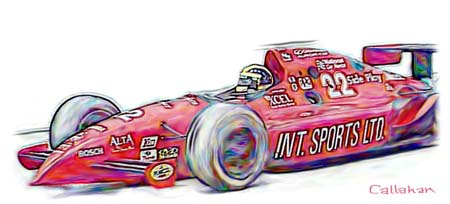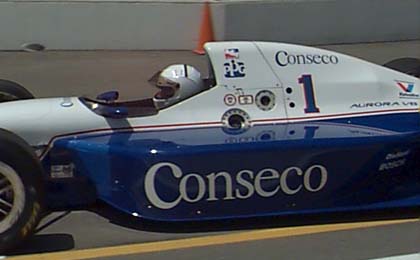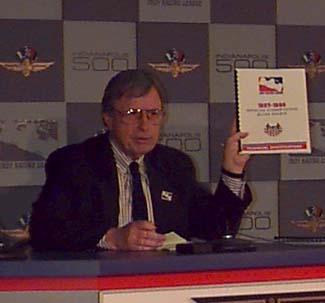The Callahan Report from Indianapolis, May 16
16 May 1997
In Search Of PowerINDIANAPOLIS: It is the famine of 1997. There is a shortage of engines. Oldsmobile Aurora and Nissan Infiniti, the engine manufacturers for the IRL, have done a splendid job of making engines given the short time table they have had to work with. Both companies had racing engines performing track testing in less than a year.
As impressive as the performance of the engine manufacturers was, it is not enough to keep up with the demands of the famed Indianapolis Motor Speedway. Teams here are treating the engines they have as if they were gold. They are. There are 64 cars here...a little more than 70% of them have engines.
The unqualified cars are running a few laps to make sure they have the speed required to make the race. They record the conditions and the setup of the cars and then park them. They wait for the conditions to change, and do it again, nursing their precious equipment.
Some of the better funded teams have extra engines. They run all day
with their hard to find power plants installed in their backup cars.
The teams searching for engines look on with envy, lap after lap.
It takes big money to go racing at Indy. There is no shortage of
funds. All the money in the world does little if there is nothing to
buy.
Track Update
There have been 16 cars on the track turning 303 laps. The fastest
speed was turned in by Tony Stewart (in his backup car). He circled
the track at 216 mph in a race setup. Greg Ray was over 215 mph in his
unqualified car. Ray made a qualifying attempt last weekend. He had
three laps in the 215 mph range before running out of fuel. He will
attempt to qualify Saturday.
Billy Boat was in the top ten in his Conseco car owned by A.J. Foyt.
He is planning to qualify the car tomorrow.
Johnny O'Connell was also in the top ten but his car was destroyed in
a crash earlier today. O'Connell will undergo surgery later this
afternoon for a dislocated arch on his left foot. He will also be
having a routine CAT scan. He will be admitted to Methodist Hospital
in Indianapolis.
There will be a delay in further updates on Johnny O'Connell due to a
traffic accident in the Indianapolis area. Several people have been
injured and one person killed as a vehicle lost control and went into
a crowd of pedestrians. Methodist Hospital is on alert, causing the
reporting delays.
Johnny O'Connell Crashes
INDIANAPOLIS (12:45 PM): Johnny O'Connell crashed at the Indianapolis
Motor Speedway this afternoon. O'Connell was practicing in the number
1 Conseco/A.J. Foyt Enterprises car when he blew an engine entering
turn one. The car did a three quarter spin and went head first into
the wall. Safety crews took several minutes removing O'Connell from
the car. The car was extensively damaged.
O'Connell was named to drive the Conseco car after Scott Sharp was
injured in a crash last Friday. This is the third crash this month for
the Conseco team. O'Connell had just completed a lap at almost 213
mph.
O'Connell has been transferred to Methodist Trauma Center,
Indianapolis. He is awake and alert. He is complaining of left foot
and ankle pain. O'Connell also has minor cuts on his face. His
condition is stable.
The 25/8 Rule Is Gone
INDIANAPOLIS: Leo Mehl, executive director of The Indy Racing League,
announced this morning that the much publicized twenty-five/eight rule
will no longer be in effect after this year's Indy 500. The rule was
implemented in 1996. It guaranteed that twenty-five spots for the
Indianapolis 500 would be held for series regulars, leaving only 8
spots in the field for "at large" participants.
Championship Auto Racing Teams (CART) used the rule as a basis for
their boycott of the 1996 and 1997 Indy 500. Mehl said the rule was
necessary. It was used by the IRL as an insurance policy. The rule
showed a commitment by the IRL to the teams that wanted to participate
in the series. Mehl said that the 33 fastest qualifiers will start the
1998 Indy 500.
Mehl met with IRL team owners this morning prior to the public
announcement. He stated that the owners and the IRL were in agreement
on the decision.
The specs for the cars will remain the same through 1998. Engine
manufacturers supply rules were modified slightly. In the past, engine
manufacturers were allowed one date per year to announce their
intention to supply engines to the series. Engine suppliers will now
have two entry dates per year. They must submit engine plans to the
IRL for review prior to manufacturing approval. Chassis supplier's
rules remain unchanged.
The theory behind the IRL chassis and engine rules is to reduce the
cost of racing. Mehl said that the IRL does not want to have its
equipment become obsolete after one year of use.
Overview Of The Rules:
Policies: All IRL Teams will use an approved chassis and an approved
engine. Approved chassis manufacturers and engine manufacturers will
make their products available to all IRL teams that wish to purchase
them.. Approved chassis and engines will be available at prices that
do not exceed the prices in the standard IRL manufacturer agreement
entered into between the manufacturers and the IRL.
IRL Approval Process Overview:
Chassis: There will be a nine month lead time for new chassis to be
approved and only one introduction date for the season. The IRL must
receive written notice from manufacturers no later than April 1, 1998
for the 1999 season; April 1, 1999 for the 2000 IRL season.
Engine: There will be a nine month lead time for new engines to be
approved and two introduction dates for the season. The IRL must
receive written notice from manufacturers no later than: September 1,
1997 to be effective June 1, 1998; April 1, 1998 to be effective
January 1, 1999 for the 1999 IRL Season.
Chassis and Engine Availability: The Manufacturers must have their
products available to IRL Teams no later than January 1. Upon receipt
of a deposit, the manufacturer must deliver the complete order to the
IRL Team within three months of receiving the order. If the
manufacturers are unable to fill all orders received from IRL teams,
the IRL will determine the priority of orders.
Terry Callahan -- The Auto Channel

Marco Greco is just one of many drivers nursing equipment.font size=-1>
 Johnny O'Connellfont size=-1>
Johnny O'Connellfont size=-1>
 Leo Mehlfont size=-1>
Leo Mehlfont size=-1>


